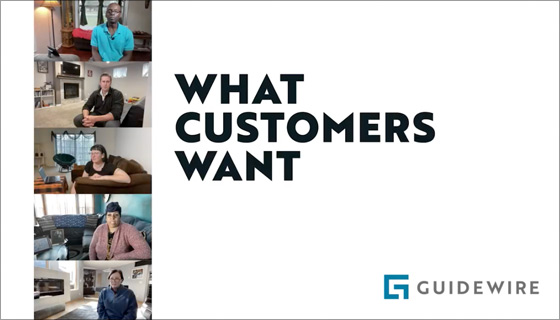
Many have pointed out that COVID-19 didn't create new technology trends in P&C insurance, it just accelerated them. But that doesn't mean a decade's worth of digital transformation crammed into 18 months has been easy.
As the world reopens in fits and starts, insurers find themselves competing on terra incognita—a consumer landscape transformed by adoption of digital channels that have sent expectations for ease and convenience into the stratosphere.
To stay on top of rapidly evolving buyer sentiment, our team at Guidewire conducted extensive, remote video interviews with a representative sampling of insurance customers spanning a diverse range of consumer segments roughly six and 12 months into the pandemic. What emerged was the picture of a marketplace that has undergone—and continues to experience—profound change.
After months of shelter-in-place and work-from-home mandates, it's not surprising that digital convenience is a must at every stage of the insurance lifecycle, from purchasing a policy to filing a claim. But it's also just the beginning.
Voice: The Original User Interface is Trending
Our interviews revealed a steady through-line that should be instructive to insurers.
Today, consumers want their companies to reach out to them with recommendations based on their unique needs, and make it effortlessly easy to act on those suggestions. Perhaps most of all, they prize tech-forward brands that prevent or mitigate issues before they become costly problems—and simplify everything else.
For instance, consumers want insurers to leverage popular, automated consumer technologies like Apple Siri, Amazon Alexa or Google Home to make filing claims and management subsequent repairs easy. And they want their insurers to really understand, in fact anticipate, their evolving needs.


Technology for Humans: Building Emotional Connections
But its more nuanced than just giving consumers access to automated service, voice or otherwise. Convenience and efficiency? That's simply expected. Fast, frictionless service? What else is new. To win in today's insurance marketplace requires the ability to bring something deeper to digital interactions. As author Steven Van Belleghem ("How Digital Becomes Human") and I discuss during a recent Guidewire virtual event, tech-forward brands are tapping data, analytics, and artificial intelligence to create emotional connections that transform customer relationships.

UBI: Usage-based Insurance on the Rise
Fueled by pandemic related changes in driving habits, one sentiment we heard consistently in our interviews with auto insurance customers was a growing demand for usage-based insurance. At its most essential UBI is personalized, pay-as-you-drive auto coverage that leverages telematics technologies to price premiums based on miles traveled, and real-time driving behavior.
Our interviews jive with studies from Forrester Research that project ownership of UBI auto policies will grow 50% in 2021—and could account for 20% of all auto policies within the next three years—well after the pandemic is (hopefully) in our rearview mirrors. They are also validated from what we've seen in response to Guidewire's UBI solution.
In a recent implementation, for instance, the Canadian Automobile Association (CAA) was able to leverage our solution to launch a new UBI policy targeting affluent consumers working from home and poorly served by old-school auto policies. The result: a 70% increase in new auto policy sales, a 30% increase in new customers, and buzz that generated more than 3 million mentions in social media.
Watch this video session from a May 2021 virtual event to see how Guidewire makes use of smartphone-based telematics to power this kind of UBI-centric auto coverage from quote to claim—including automated first-notice-of-loss (FNOL) capabilities that are all kinds of awesome.

Bottom line: Ease and convenience are as important as ever, but are no longer differentiating on their own. To win in today's insurance marketplace, consumers are telling insurers what they want: transparently-priced, personalized, and proactive coverage that combines the best of technology and human, empathetic service. The insurers that get it right stand to score big. Those that can't will have some serious catching up to do in the months ahead.

To receive my thought leadership direct to your inbox, subscribe to my once-a-month email newsletter, The Drabik Digest now!